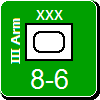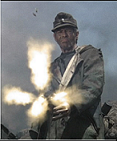Capt. Harlock
Posts: 5358
Joined: 9/15/2001
From: Los Angeles
Status: offline

|
150 Years Ago Today:
Lord Lyons, the British ambassador in Washington, officially gave Secretary of State Seward the British government's note on the Trent affair. The clock was now ticking: the U. S. government had one week to reply. If the reply was not satisfactory to Her Majesty's Government, Ambassador Lyons was to return to London, which was often the prelude to a declaration of war. Seward was now in a much calmer frame of mind, and gave Lyons a fairly long speech on the principle of freedom of the seas without actually committing to anything one way or the other.
However, once his long-winded interview had come to a close, Seward lost no time in laying the not before Lincoln. The President directed Seward to prepare a list of reasons why Mason and Slidell should be given up, while Lincoln himself would prepare a list of reasons why they should not be given up.
The tide of the war in Missouri was now favoring the Union. The Confederates had to make do with recruits from the countryside, while the Northerners could draw on men from St. Louis, the only real city in the state, plus U.S. Army units from other states. Union brigadier general John Pope had been using this advantage to march a force of 4,000 men around the state, defeating smaller rebel units.
Now Pope had learned of a recently formed regiment at Milford, or Blackwater Creek. He put together a fairly sophisticated battle plan, using cavalry to circle around and cut off the Confederate retreat while his infantry attacked across the bridge to the camp. The infantry force was commanded by the inconveniently named Colonel Jefferson C. Davis (no relation to the Confederate President). Since Davis had something to prove, his men attacked vigorously, forcing the bridge and gaining a firm position on the other side. Shortly afterwards, the Southern commander received the news that Northern cavalry had succeeded in blocking his retreat, effectively surrounding him. After a brief parley, he surrendered.
The Federals lost only two men killed and eight wounded. Pope claimed he had captured 1,300 men, but it was closer to 700. Still, the news put a serious damper on Southern recruiting in Missouri: no one wanted to enlist if they were going to be promptly captured. Equally badly for the rebel cause in the state, all of the regiment's supplies had fallen into Union hands, including 500 horses and mules, 73 fully loaded wagons, and 1,000 stand of arms, which the Southerners would find very difficult to replace.
There was one other significant capture. Among the Southern officers was a Colonel Ebenezer Magoffin, who had been previously taken prisoner and released on parole. Since he was engaged in military activity, he had violated the terms of his parole, and a Union military tribunal sentenced him to be shot. But Magoffin also happened to be the brother of Kentucky Governor Beriah Magoffin. Since Kentucky was still a sensitive area, President Lincoln intervened and requested a review of the sentence. Before the review was completed, Magoffin and several dozen other inmates would implement their own solution by tunneling out of Alton Prison and escaping.
< Message edited by Capt. Harlock -- 12/19/2011 8:32:14 PM >
_____________________________
Civil war? What does that mean? Is there any foreign war? Isn't every war fought between men, between brothers?
--Victor Hugo
|
 Printable Version
Printable Version




















 New Messages
New Messages No New Messages
No New Messages Hot Topic w/ New Messages
Hot Topic w/ New Messages Hot Topic w/o New Messages
Hot Topic w/o New Messages Locked w/ New Messages
Locked w/ New Messages Locked w/o New Messages
Locked w/o New Messages Post New Thread
Post New Thread